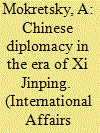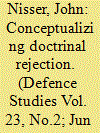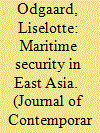| Srl | Item |
| 1 |
ID:
164649


|
|
|
|
|
| Publication |
Princeton, Princeton University Press, 2019.
|
| Description |
xv, 376p.hbk
|
| Series |
Princeton Studies in International History and Politics
|
| Standard Number |
9780691152134
|
|
|
|
|
|
|
|
|
|
|
|
Copies: C:1/I:0,R:0,Q:0
Circulation
| Accession# | Call# | Current Location | Status | Policy | Location |
| 059606 | 355.422/FRA 059606 | Main | On Shelf | General | |
|
|
|
|
| 2 |
ID:
169511


|
|
|
|
|
| Summary/Abstract |
THE 19TH CONGRESS of the Communist Party of China (CPC) was held on October 18-24, 2017. Chinese media noted that the Congress took place was open and global in nature: It was covered by more than 3,600 journalists, including 1,818 correspondents from Hong Kong, Macau, Taiwan and 134 countries. In addition, the idea of "comprehensively covering an event of global significance" was presented as broadcasting China's voice to the world and explaining the country's plan for future development.
|
|
|
|
|
|
|
|
|
|
|
|
|
|
|
|
| 3 |
ID:
190446


|
|
|
|
|
| Summary/Abstract |
Doctrines are considered a key component of military power, shaping the ways in which armed forces organize and operate. This study critically examines the assumption that armed forces can change their practices by writing formal doctrine. The study addresses the research problem of why some formal doctrines are implemented and others are rejected. It does so by developing and testing a novel theoretical framework on doctrinal implementation through a comparative case study on rejection of the US Army 1976 Active Defense doctrine and successful implementation of the 1982 AirLand Battle doctrine. The study shows that contrary to popular beliefs, the actual concepts within a formal doctrine do not seem crucial for whether it is implemented or rejected. Rather, cultural coherence and inclusive creation seem crucial in this regard.
|
|
|
|
|
|
|
|
|
|
|
|
|
|
|
|
| 4 |
ID:
151417


|
|
|
|
|
| Summary/Abstract |
The origins and role of the concepts of peaceful coexistence and active defense in Chinese foreign policy are investigated and applied to China’s policy toward the Diaoyu/Senkakus. The dominant moderate conceptual strategic thinking encourages Beijing to aim for the establishment of a modus vivendi with Washington and Tokyo that involves a de facto presence of China alongside both the US and Japan. However, Beijing’s signaling is complicated by radical voices that undercut coexistence.
|
|
|
|
|
|
|
|
|
|
|
|
|
|
|
|